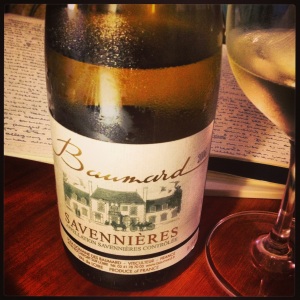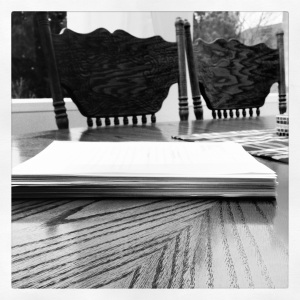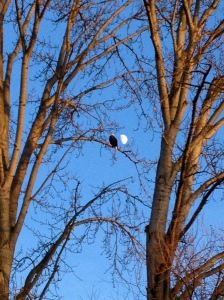I almost bailed. It wasn't just the hangover. I tend to get a little manic in the early half of hangover recovery (I swear my best runs are the morning after one too many glasses of wine). But that night, it was the M. Stansfield, the Lazy Gardener and a shared carafe of sake. And the pork belly dumplings. And the kimchi.
I was up early, despite the gin. I went for a swim - endorphins being the best hair-of-the-dog I know - then home to a monster plate of poison-soaking-up pancakes. And I still had hours to sneak in lunch and perusal at Elliott Bay Books before the afternoon writing workshop at Hugo House.
It was more that I'd had a shitty two weeks of writing. I'd kept up with my early morning writing sessions, except for the two days we were out-of-town almost buying a house and then not and then leasing an apartment. And the one morning I was compelled to finish the book that had so enraptured me during a bout of raging insomnia a few hours before. Turning its final pages, I sat on the sofa clutching a gut-scorching mug of coffee and I sobbed. Then I went to work and quit my job. Didn't get much writing done that day. And then there was the morning after the night before, my brain too hazy with gin and kimchi to face pen and blank paper.
But really, I've churned out some pages. Just not as many as I'd've liked. Weekends have been distracted frenzies of packing and shopping for things that I fear I will need but won't be able to just pop out and purchase once I leave a city of 4 million for a peninsula of 10,000. I missed my February goal of 90,000 total by... oh... 5,000 words. Or so. Not fair. It was a short month by four days. I might have made it, otherwise.
So on this day, after my swim and pancakes, after peppermint tea and Advil, I settled at my desk with several days' worth of writing to type into my manuscript. Got the iPod queued up with hours of rainy day tunes and shut down the social media sites. My fingers flew across the keyboard. Then the pounding began. And it wasn't in my tender head.
At first I thought the culprit was the young architect upstairs who introduced himself to our complex last Halloween by throwing a raging party (my neighbors and I don't party. Sometimes the guy across the courtyard yells during football season) that resulted in me calling the landlord at 7 the following morning to have someone clean up the vomit on our patio spewed by a party girl from the balcony above. I'm not a fan of the guy upstairs. And he's a stomper. A small guy who crosses his living room like Charlton Heston in a chariot pulled by water buffalo.
But it wasn't Stomper Boy. It was coming from below the apartment. I discovered the landlord in the basement, repairing the basement ceiling, i.e. my frigging floor. For over an hour, I was subjected to hammering, drilling, thumping. Then the birds that nest in the chimney got going. Soon I was surrounded by a convention of noisemakers, all of whom were clearly aware that this was the first time in days I had sat down at the computer, knuckles cracked, primed to work. I did work, between bouts of cursing, but it wasn't quality - it was a secretarial act, retyping my longhand without registering my intent in the words.
I considering bundling myself, laptop and notebook off to the Queen Anne branch of the SPL, where I spend most weekend afternoons. But then the hangover fatigue hit and I knew after thirty minutes wrapped in the blanket of a warm, quiet Reading Room, I'd be mush. And by the time I settled in, I'd have to turn right around and schlep across town to Capitol Hill and Hugo House to attend a workshop I'd registered for last December in a pique of writerly enthusiasm. Which was now the one hundred percent last thing I wanted to do.
So I gave a "Fuck it" and stomped out the front door.
Ah jeez.

Sometimes I just want to talk about writing. I want to hear other people talk about writing. Workshops are dandy and handy and I nearly always come away with a scrap, or a collection of scraps, that I can mine for story ideas, motivation, contemplation. But I am not a star at writing well on cue - it's gotten easier, as I've mentioned before - but I'm about as skilled a spontaneous writer as I am a speaker - which means I'm better off remaining the mysterious, quiet presence in the back of the classroom. Keep 'em guessing. Never let 'em hear you sweat.
At some point during the afternoon, our guide and conspirator Jonathan Evison, author of the New York Times bestseller West of Here (2011), The Revised Fundamentals of Caregiving (2012), and recipient of the Washington State Book Award for his debut novel All About Lulu (2008), confessed he'd been dreading this workshop for several weeks. "I'm not a teacher," he proclaimed in the opening minutes of our hours together. "I don't believe you can teach writing. Just ask me some questions."
It wasn't a workshop. It was a talkshop, a thinkshop, a laughshop. The topic was ostensibly the relationship between the writer and the reader, which is first and foremost a dialogue the writer has with herself. What is the effect I'm trying to create with the story? What do I want the reader to walk away feeling, considering, sorting out? We discussed the assumptions we must make about our readers' intelligence. As writers, we should "understate our expertise" by not engaging in a brain dump of research to ensure our readers get where the story is coming from and how the context informs the present action. This is critical for me to consider, as the very nature of historical fiction is fraught with sinkholes of exposition and backstory.
We talked about allowing characters free rein, to respect the direction characters take and to be prepared to "reverse engineer" the plot when the logic of the story or the logic of the characters' character demands it. I foresee putting on my big girl pants and wading into the muck of my plot for some serious reverse engineering in drafts to come.
We chatted about tension in story arc, the dance between the logic of the characters - remaining consistent with their nature - versus "subverting the reader's expectation" by taking the story in a direction they won't expect, yet by the end, becomes the only direction that is true to the story.
But mostly, we just kvetched. We spilled about the business of writing, about beta readers, editors, publishers, agents and failure. We examined the trajectory of an author who wrote his first novel in 1987, at the age of 19. Many novels and lifetimes later, the first published novel appeared in 2008, when Evison was 40. Twenty-one years of scraping together enough part-time gigs to support a writing habit that now supports a family full-time. To have the opportunity to mine the brain of a hard-working writer who takes nothing for granted blew away the cost of admission.
We compared work styles - Evison is yet one more champion of the first-thing-in-the-morning, long-hand school (I remember a workshop I attended a couple of years ago when the author strongly advocated early morning writing. I still have my notes, in which I scribbled "I'm up at 4:30 to run as it is, how the hell can I get up any earlier to write?" It took me another year to admit to myself I was making excuses about not having the time or energy to write while working full-time. Two years later, I see a novel coming together that will have been written nearly entirely between 4:30-5:15 a.m., one page at a time. This shit works, people. If you can't be there every day, aim for a minimum of 5). Evison revises as he goes, which I'm able to do with short fiction, but I fear I'd never finish if I attempted real-time revision with the novel. He writes a page a day, 320 days a year. A novel is born.
And we talked about what it is to be a writer. Which in the end has nothing to do with anything above. It is the moment you lose yourself in the story, you feel no hunger, no thirst, no pressure on your bladder. When you look up at last, you see that hours have passed. You felt only the characters acting through you; you became a conduit for the story to flow from the universe to the page. How it gets there and who eventually reads it is irrelevant to the fact that the only requirement to be a writer is to write. Jonathan Evison is correct. That can't be taught. It can only be done.
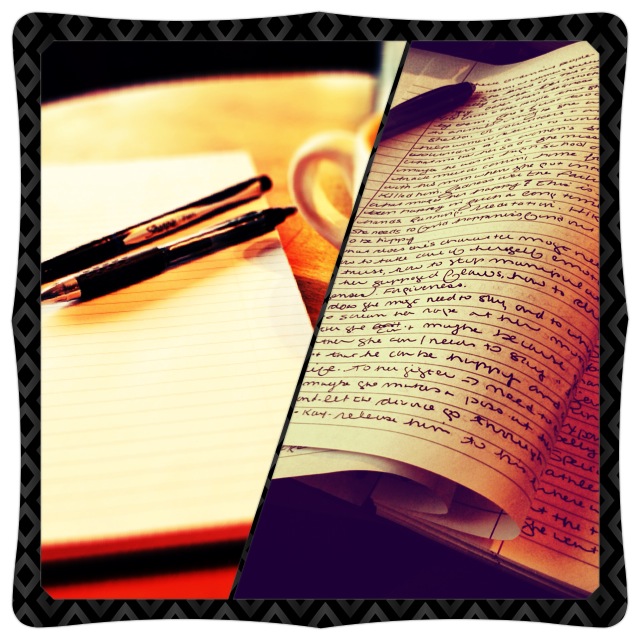
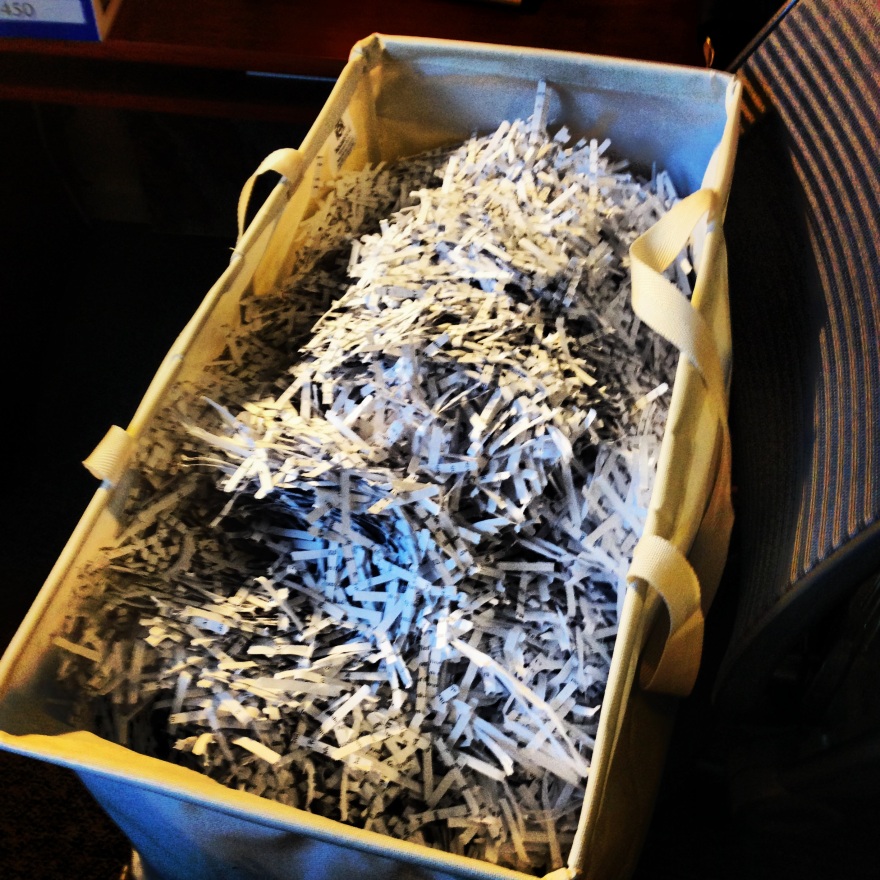





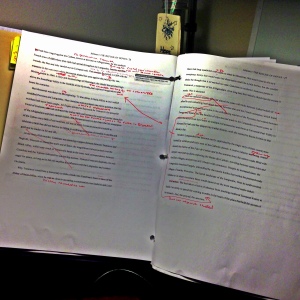 Since my foray into full-time writing began in mid-July, I've been editing. I started at the beginning of The Novel and I'm working my way, scene by scene, to the end. I'm filling in plot holes, finessing the details of setting and history, and adding dimension to my characters. Revising. Rewriting. Amending. Emending. Butchering. Compiling. Tightening. Refining. I nearly entitled this blog post "Revising is like Vodka" because it feels as though I haven't done much writing. But it's all writing, isn't it? It might not be the curl-up-on-the-sofa-at-4-am-with-Pilot-Fine-Point-and-Moleskine that got me the meat of a novel, but it's the work that will get me to the heart of all I've written.
Since my foray into full-time writing began in mid-July, I've been editing. I started at the beginning of The Novel and I'm working my way, scene by scene, to the end. I'm filling in plot holes, finessing the details of setting and history, and adding dimension to my characters. Revising. Rewriting. Amending. Emending. Butchering. Compiling. Tightening. Refining. I nearly entitled this blog post "Revising is like Vodka" because it feels as though I haven't done much writing. But it's all writing, isn't it? It might not be the curl-up-on-the-sofa-at-4-am-with-Pilot-Fine-Point-and-Moleskine that got me the meat of a novel, but it's the work that will get me to the heart of all I've written.

